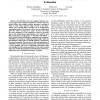Free Online Productivity Tools
i2Speak
i2Symbol
i2OCR
iTex2Img
iWeb2Print
iWeb2Shot
i2Type
iPdf2Split
iPdf2Merge
i2Bopomofo
i2Arabic
i2Style
i2Image
i2PDF
iLatex2Rtf
Sci2ools
ICRA
2007
IEEE
2007
IEEE
CRF-Filters: Discriminative Particle Filters for Sequential State Estimation
Abstract— Particle filters have been applied with great success to various state estimation problems in robotics. However, particle filters often require extensive parameter tweaking in order to work well in practice. This is based on two observations. First, particle filters typically rely on independence assumptions such as “the beams in a laser scan are independent given the robot’s location in a map”. Second, even when the noise parameters of the dynamical system are perfectly known, the sample-based approximation can result in poor filter performance. In this paper we introduce CRF-Filters, a novel variant of particle filtering for sequential state estimation. CRF-Filters are based on conditional random fields, which are discriminative models that can handle arbitrary dependencies between observations. We show how to learn the parameters of CRF-Filters based on labeled training data. Experiments using a robot equipped with a laser range-finder demonstrate that our t...
| Added | 03 Jun 2010 |
| Updated | 03 Jun 2010 |
| Type | Conference |
| Year | 2007 |
| Where | ICRA |
| Authors | Benson Limketkai, Dieter Fox, Lin Liao |
Comments (0)

